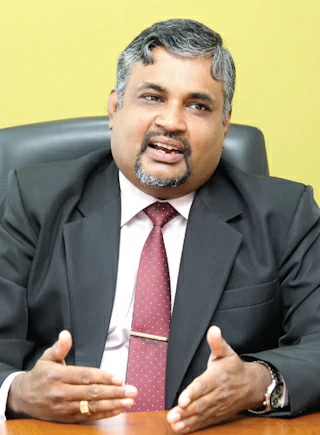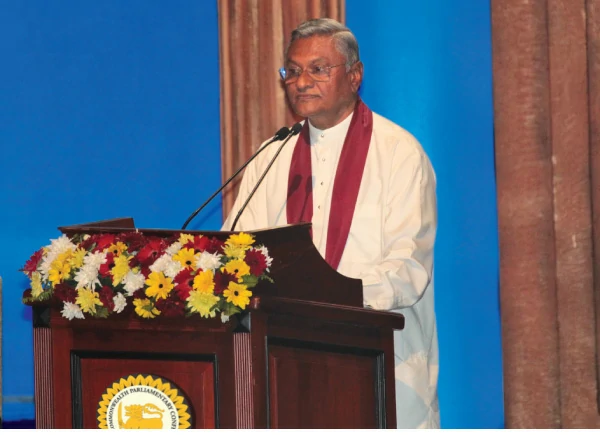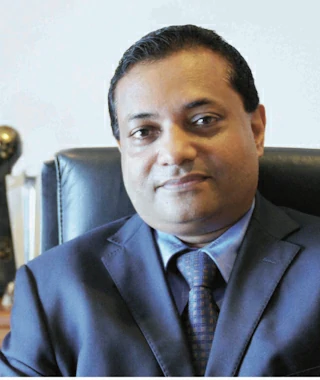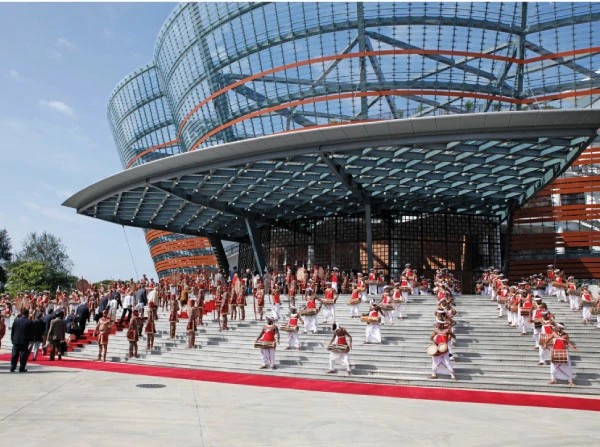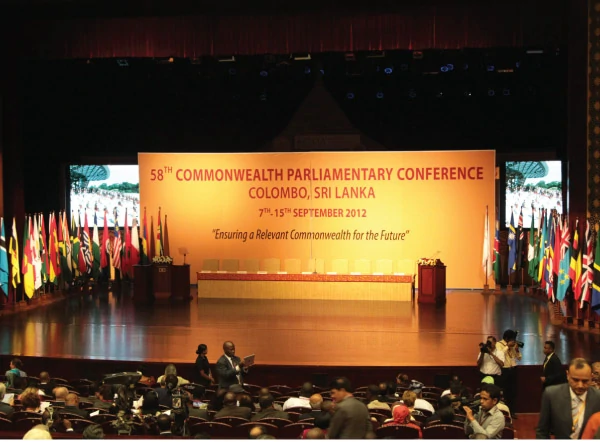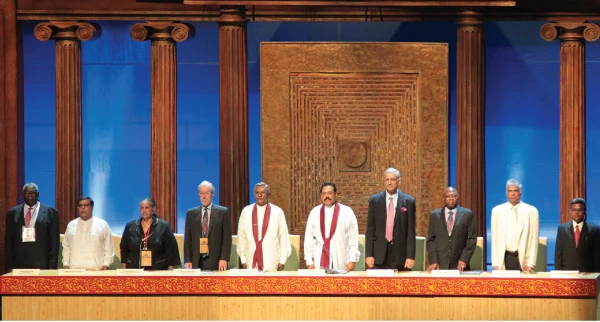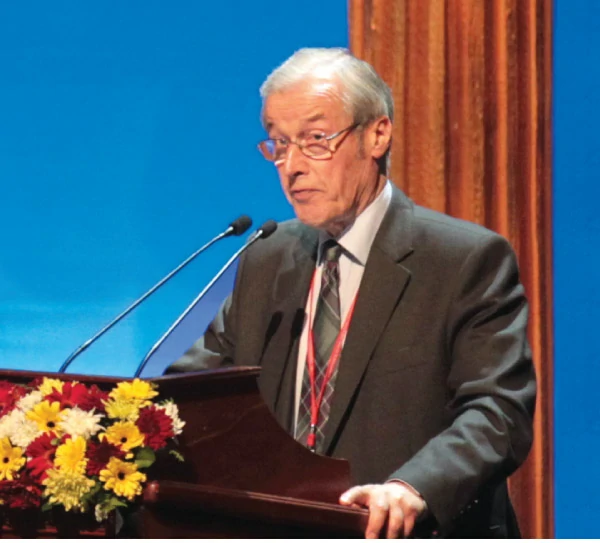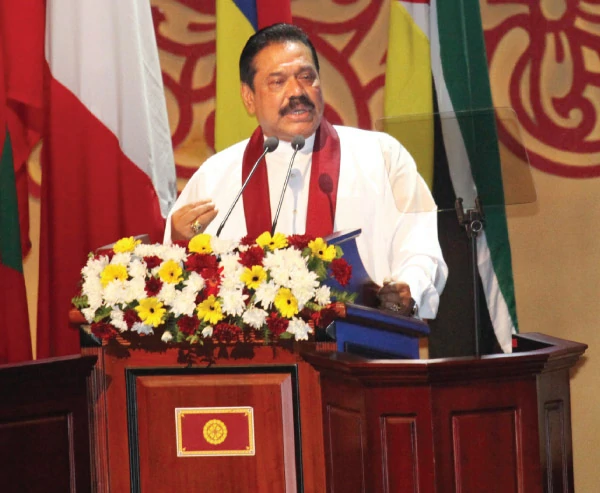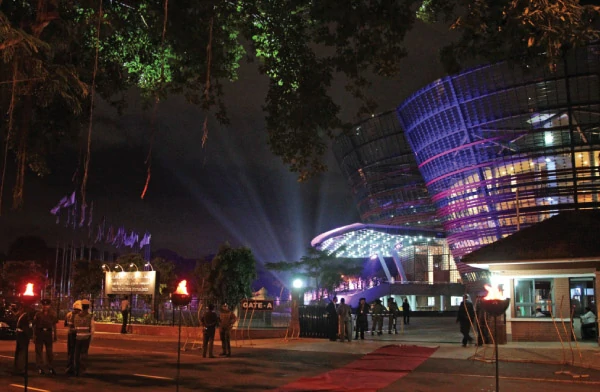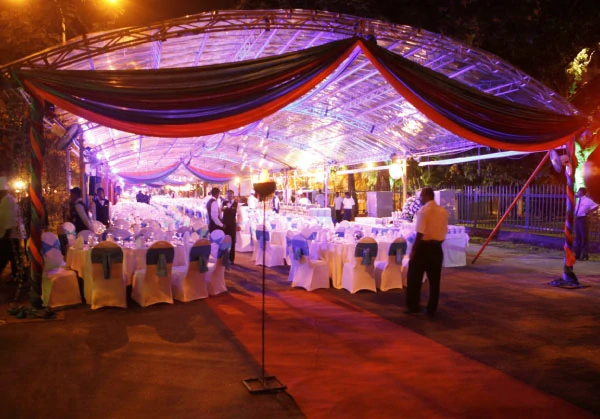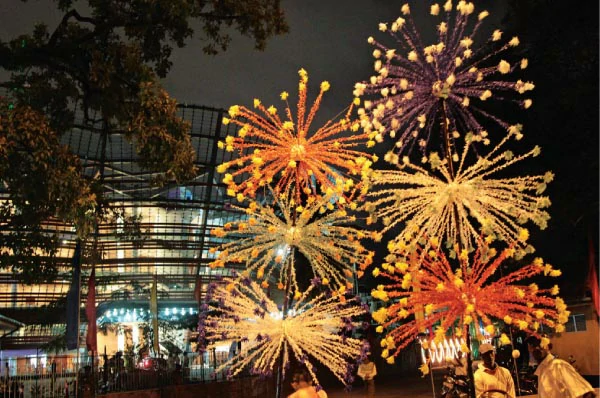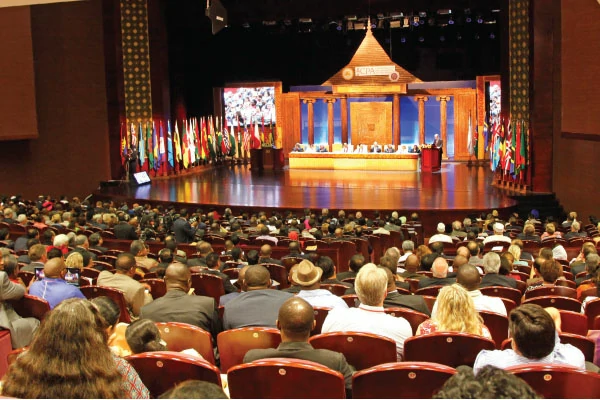
Sri Lanka has been a member of the Commonwealth Parliamentary Association (CPA) since gaining Independence in 1948. Since then, the membership of the CPA has provided many Parliamentarians and members of the Parliamentary Staff of Sri Lanka invaluable opportunities for information sharing, capacity building and skills development, while also enhancing their knowledge of Parliamentary practice, procedure and administration.
The objectives of the CPA have evolved to encompass Democracy, Democratic Institutions, Good Governance and Rule of Law, where current values and issues are included to form a more modern direction for the CPA as well as the Commonwealth.
As an active member of the CPA, the Sri Lanka Branch has contributed towards its worthy endeavour of promoting the advancement of Parliamentary Democracy by enhancing knowledge and understanding of democratic governance, by hosting several major CPA events such as the Annual CPA Conference in 1974 and 1995 as well as several other Conferences and Workshops during the course of the years.
The 58th Commonwealth Parliamentary Association Annual Conference, brought together approximately 800 Parliamentarians and Parliamentary staff from 175 CPA Branches to discuss and share experiences pertaining to the strengthening of Parliamentary democracy throughout the Commonwealth. The Conference was officially inaugurated by President Mahinda Rajapaksa.
“My Country Is Proud Of Its History, Its People And Its Tradition Of Constitutional Democracy.”
Welcome Address and Message from Queen Elizabeth II, Patron of the CPA by Chamal Rajapaksa, Speaker of the Parliament of Sri Lanka and President of the CPA
Her Majesty has sent the following message:
As the Patron of the Commonwealth Parliamentary Association, I am pleased to send you and all the delegates of the 58th Commonwealth Parliamentary Conference, my best wishes for your meeting in Colombo, Sri Lanka.
I note with interest representatives from approximately 170 Parliaments and Legislatures will be attending the meeting. I was also pleased to learn that this years’ theme for the discussion will be “Ensuring a Relevant Commonwealth for the Future”. As your Patron I much appreciate your kind message and hope that the conference is a successful and enjoyable event for all concerned. Signed Elizabeth R.
Nama Buddhaya
On behalf of the Sri Lanka branch of the Commonwealth Parliamentary Association I am honoured and privileged to welcome you all to the opening ceremony of the 58th Commonwealth Parliamentary Conference. This is the third time we are hosting this meeting in Sri Lanka and that is a reflection of the strong commitment Sri Lanka and our people have towards the values of the Commonwealth and our dedication for Parliamentary democracy, which forms the core values of this Association.
Members of the Commonwealth Parliamentary Association are bonded by a shared history, the history of British colonialism. This shared history runs as a thread that binds us together and undoubtedly enabled us to create this Association and to promote Parliamentary democracy and good governance among our member states.
We Sri Lankans received universal franchise in 1931 over 80 years ago when we were still a colony. Since receiving Independence in 1948 the country has had an unbroken tradition of multi party democracy with regularly held elections and political power alternating between different political parties. We are immensely proud of the democratic tradition we have nurtured over these 64 years since gaining Independence and will continue to ensure that Parliamentary democracy remains vibrant and robust in this part of the world. It is because of this commitment to Parliamentary democracy that the Commonwealth has bestowed on Sri Lanka the honour of hosting the Commonwealth Heads of Government meeting in 2013.
The Sri Lanka branch has been a member of the Commonwealth Parliamentary Association for many years. It has played a positive role in the main forum and within the Asia regional group. Currently our branch functions as the regional secretariat for the Asia region and hosted the CPA regional conference in 2011. Our branch also sits as the representative of the Asia region of the Commonwealth Women Parliamentarians Steering Committee. These are all testimony to our unreserved commitment to the Commonwealth and its future progress.
Let me say how proud we are to be hosting this meeting at a time when peace in all parts of our country is irreversibly established. For thirty years Sri Lanka had to fight the worst of terrorism. It simply destroyed the social fabric and almost divided the Sri Lankan nation into pieces. I admire the resilient, courage and patience of all of our people who had to endeavour tremendous hardship during the long period of the conflict. It is our firm intention to strengthen the bonds of friendship between all communities that inhabit this island and ensure that their children will grow up in a culture of peace and co-existence.
All of our actions today are directed at building a harmonious nation where discrimination will not be tolerated. As a people we are thankful to the Commonwealth for the continuous support member nations extended to us and for the understanding that you showed, at a time of need. My country is proud of its history, its people and its tradition of constitutional democracy. Dear friends, while in Sri Lanka, may I humbly invite you to savour the natural beauty and the splendour of our motherland and engage with her people who are amongst the most hospitable people you will find anywhere in the world.
Ensuring a Relevant Commonwealth for the Future is the theme of this meeting. During these few days you will discuss topics relating to health and education, democracy, rule of law and human rights, the role of Parliaments, conflict resolution and peacebuilding, gender responsive governance, terrorism, youth unemployment and the role of social media. All these topics are of great relevance to democracies around the world, no doubt your deliberations will strengthen constitutional democracy and good governance in the CPA member states.
The CPA is currently engaged in a study to look at how the Association can provide better support to Parliaments from member states. Our branch has expressed its views through its regional representative and we are concerned to ensure that the CPA remains vibrant and relevant in the years to come.
Before I conclude I would like to express my profound gratitude to His Excellency Mahinda Rajapaksa, President of Sri Lanka for the support, guidance and encouragement extended to us in organising this event and your presence this morning has encouraged all of us. I must also acknowledge the support we have received from Rt Hon Sir Alan Haselhurst, Chairman of the Executive Committee of the CPA, Dr William F Shija, Secretary General of the CPA and the staff of the CPA headquarters. May you have a rewarding meeting. May you forge strong bonds among your fellow parliamentarians and may your deliberations contribute to strengthening democracy in all parts of the Commonwealth. I do hope that you will carry warm memories of Sri Lanka to your home country. Distinguished delegates, ladies and gentlemen it is my priviledge and great pleasure now to call upon His Excellency Mahinda Rajapaksa, President of the Democratic Socialist Republic of Sri Lanka to formerly declare open the 58th Commonwealth Parliamentary Conference. May the Noble Triple Gem Bless You.
“What We Have In Common Is What Binds Us Together.”
Sir Alan Haselhurst, Chairperson of the CPA
2012 has been quite a year. Distinguished perhaps in the minds of many by the Olympic Games and the Paralympic Games. Who could not recall the achievements of Usain Bolt, the Jamaican trio, Stephen Kiprotich who won astonishingly the marathon, Oscar Pistorius and the news that Sri Lanka won their first bronze medal in the Paralympic Games. The spread of success was terrific and we hope that it is a legacy for young people throughout the Commonwealth.
Then there is another major event here in Sri Lanka before the T20 Cricket World Cup takes place we have this important gathering. I do not know whether other visitors became confused with the perfusion of signs advertising both the CPA conference and the T20 World Cup but I suspect that it gives a hint as to the hearts and minds of your citizens who may be more easily captured by Cricket, than the proceedings of our conference. I must say despite that I am astonished by the amount of coverage we have had in the press and I don’t think that I have ever had such front page attention in the newspapers here than I have ever achieved in 35 years back home.
I am sure that you will agree with me that having the 58th CPC here and now in Sri Lanka is indeed serendipitous. Serendipitous because we have the opportunity to witness the rejuvenation, the reinvigoration and rebirth of a country that has risen phoenix like from the ashes of violence and turmoil. Serendipitous because we at the CPA must also renew and progress in the first year of our second century. Sri Lanka finds itself in the spotlight in a happier way than for many years. Sri Lanka could indeed be seen as inspirational. It is one of the most literate countries in the emerging world. An economy that has grown at an average of eight percent over the last few years. Low unemployment, expanding industries in IT, nanotechnology and banking, tourism is booming and exports are strong. Sri Lanka has a lot to be proud of, but surely its greatest pride should come from peace, it is peace that has driven this momentum of change. And it is peace that should continue not as an unusual novelty but as a way of life.
Hopefully, the momentum that is driving Sri Lanka forward under the Government of President Rajapaksa should inspire us because we too in the CPA must move ahead with renewal and reinvigoration.
Here today in this magnificent hall you probably realise and wish, like me, to engage, network, learn and listen to the diversity of experience, knowledge and expertise that is around us. The true purpose of the CPA comes out when one sees representatives from all over the Commonwealth stretching over five continents coming together, respecting each other, talking with each other and learning from each other. Let us resolve in this week in the delightful setting that we have been given in Sri Lanka, let us give it full meaning here and in the years ahead and remember always that what we have in common is what binds us together.
“Democracy Stands For Unity Of Purpose In A Spirit Of Mutual Understanding.”
Address by President Mahinda Rajapaksa
As the current Vice Patron of the Commonwealth Parliamentary Association, I am pleased to welcome all delegates to this 58th Commonwealth Parliamentary Conference in Colombo and honoured to address you on this occasion.
This is an organisation with a long and distinguished history in the annals of modern democracy. It was begun in 1911, as the Empire Parliamentary Association, when the British Empire was at the height of its strength, when the sun never set upon it.
Later, as the success of key freedom movements from imperialism and colonialism succeeded, as in India and Sri Lanka-then Ceylon, it was changed to the Commonwealth Parliamentary Association, as we know it today.
Sri Lanka, as one of the earliest members of the CPA, is glad to host this important international Parliamentary conference for the third occasion. It is also important to recall that Sri Lanka is among the members of the CPA, having one of the oldest traditions in Parliamentary democracy, being the first country in Asia to have universal franchise, from as far back as 1931.
We have continued this tradition of Parliamentary democracy through the past 81 years, protecting it from those who plotted against it, both in uniform and through insurrection.
More recently, we protected our democratic system, and the democratic rights of all our people, against what has been correctly described as the most ruthless terrorist organisation in the world. At a time of clashes between democracy and terror, we have shown the world that terrorism can be effectively defeated, and the cherished values of democracy restored to people who were denied it for nearly three decades.
Excellencies, Honoured Guests,
You are meeting here today, just two days after democratic elections were successfully conducted in three Provincial Councils in the country, and you may be observing how the people have freely expressed their choice. Sri Lanka’s long tradition of Parliamentary democracy has seen Governments change via the ballot, and constitutions being similarly changed and amended.
It is also noteworthy that among the first things done after the defeat of terrorism, first in the Eastern Province, and later in the entire country, was to quickly hold Local Government, Provincial and National elections to obtain a proper mandate from the people, large sections of whom were deprived of their franchise by the forces of terror.
In fact I myself sought a second term in office, even before the expiry of my first term, to obtain a truly national mandate, because the terrorists whose agents are still active in some parts of the world, denied many people in the North and East the right to vote, the first time I sought the Presidency in November 2005. We will also hold elections to the Northern Provincial Council next year upholding the principles of democracy.
The many successful aspects of post-conflict developments have drawn much attention to Sri Lanka, especially the speed with which nearly 300,000 Internally Displaced Persons were re-settled. Another important aspect has been the efforts at national reconciliation, after a bloody conflict that dragged on for nearly three decades. It took less than two years from the end of the conflict to set up the Lessons Learnt and Reconciliation Commission (LLRC). It was to learn from the lessons from the conflict, understand how we could avoid such situations again, provide justice to those who had been affected, and, most importantly, seek the path of reconciliation as a nation, through our own experiences. The recommendations of the LLRC are already being implemented, according to a well worked out Plan of Action that we have presented to the nation and the world.
Excellencies, Honoured Guests,
With our undoubted commitment to Parliamentary democracy, we have a keen interest in the work and progress of the Commonwealth Parliamentary Association. Your efforts to promote Parliamentary democracy by enhancing knowledge and understanding of democratic governance, and interest in building an informed Parliamentary community among the member nations, has our strongest support.
The many educational programmes on Parliamentary practice and procedure, the efforts at studying matters of regional importance in the development of democracy, the study of democratic systems in the world’s smallest nations, the efforts to train knowledgeable and efficient Parliamentary staff, are all in keeping with the goal of strengthening democracy in the world.
A matter of special importance is the work of the Commonwealth Women Parliamentarians to increase female representations in Parliament and recognising the importance of gender considerations in all activities of the CPA.
As the country that produced the first elected woman Prime Minister of the world, Sri Lanka is particularly interested in the moves to assist in encouraging the professional contribution of women in democratic bodies, from local authorities to Parliaments.
As an organisation that seeks to strengthen representative democracy, your efforts to ensure the conduct of free and fair elections are most encouraging. Similarly, your focus on countries with new or revived Parliamentary systems is very useful, especially with the high intake of new members to parliaments after each election.
Distinguished Guests,
The vast resources of human experience available to the CPA, which has 175 branches and 17,000 Parliamentarians at the most recent count, places it, in an excellent position to contribute to better understanding of practice and procedure in Parliaments, examine international trading systems, and look at new policies on science in an age of rapidly advancing technology. It will also be extremely useful to explore increasing trade among Commonwealth countries and devise ways to facilitate such trade.
Excellencies,
I have no doubt that the CPA has achieved much success in realising the aims of its Strategic Plan 2008 – 2012, especially in assisting Members and Branches to adopt good practice of democratic governance and strengthen the institution of Parliament. You have no doubt helped the Commonwealth deepen its democratic commitment, in big and small nations by promoting best principles of representative government that removes barriers to equality in gender, community, faith and other aspects that seek to limit democracy.
This Conference in Colombo will discuss and decide on the CPA’s new Strategic Plan for the next four years. This is a good time to think of strengthening the core values of democracy. Our work should not be confined to theories and concepts but should look at the more practical aspects that affect the people. Our emphasis on the will of the people should lead us to give the most importance to policies that best serve the interests of the people. There is the need to give the highest priority to the welfare of the people to economic progress and development that positively impact on the lives of people.
In this context, it will be interesting to look at Sri Lanka’s own record of success through democracy. Our achievements in education and health stand out as examples to other countries and societies. Our 96 percent literacy is a proud record that has come from the blend of democracy, with a great tradition of education that came down from Buddhism and later advanced through the Christian churches. Similarly, our success in providing free health services to all also comes from a great tradition of healing that was advanced through democracy.
It is also important to note that Sri Lanka achieved eight percent GDP growth last year, and the year before, after six and seven percent growth earlier, even during the battle against terrorism because of our commitment to the people and the values of democracy. It is our strong belief that there cannot be peace without development. The reverse is also true; there cannot be development without peace.
These are all subjects of much relevance today. One must look forward to this conference recognising the proper priorities in furthering the democratic process. You will no doubt take into consideration the current global realities that often seem to threaten proper and effective democracy, and also seek to challenge the sovereignty of nation states.
Distinguished Delegates,
Your presence in Sri Lanka gives you a good opportunity to see for yourselves the progress of democracy in our country, after the major threat it faced under terrorism. This is important in the context of the barrage of lies being spread about Sri Lanka today. As you will see, there is full freedom of travel to any part of the country. You can also speak to anyone, from the Government or the Opposition and different communities. I urge you to make use of this opportunity to learn of the real Sri Lanka, in its post-conflict era, when the highest priority is given to nation building through reconciliation.
It is unfortunate that today, many impressions of Sri Lanka in foreign countries, are based on unverified facts, and wrong or deliberately manipulated dis-information, carried out by those who once supported the forces of terror. These same elements continue to sow the seeds of division and separatism through various media, and also influence politicians in their new countries of domicile, to act against Sri Lanka, based on such dis-information.
These are people who claim to speak for Sri Lanka or a section of our people, while slandering the country from their shelters abroad. They do not bother to contribute to the reconciliation and development taking place here. But worse, they do not even contribute to the progress of the people whose cause they claim to champion, from their activities abroad. You can now see the truth and return to your countries with a deeper and richer understanding of Sri Lanka.
Honoured Guests,
In seeking to advance democracy in the world, which is the commitment of the CPA, it is also important to appreciate the different cultures and values of each country where democracy has been rooted, or is growing. The Commonwealth is a rich diversity of nations with the common bond of democracy. It is also a rich diversity of cultures, traditions and values. There are countries where culture and heritage date back to many millennia. There are others with shorter histories and traditions. Democracy will truly blossom when these differences are best understood and respected in all our dealings with each other.
It is necessary for all of us to be anchored in the true meaning and concept of democracy – which is the will of the people – freely expressed. Recently, we saw fears of this in the very Mother of Democracy, in the early stage of the current financial crisis in Europe. There is also an unfortunate trend we see of efforts to impose democracy on people and States. There are many who seem to think of regime change as the necessary path to democracy, without seeing the consequences of such action that stare at us today. We are also aware of how Human Rights can be made a slogan by the worst violators of such rights, to threaten traditional democracies.
Democracy, or representative democracy, is today competing for headlines with various emerging national or regional springs. There is also the hum of drones that seek to bomb democracy into place with a carpet of destruction. We must be cautious of all these strategies that experience shows have not helped real democracy to take root and thrive. It is necessary to bear in mind that democracy does not foster hatred within societies among communities and among nations and countries. Democracy stands for unity of purpose in a spirit of mutual understanding.
In conclusion, I wish to state that having your conference in a vibrant democracy, where the will of the people has been cherished, and protected for eight decades and more, there is every hope that your deliberations, amidst the well springs of democracy that prevail in our land, will produce the best results for Parliamentary democracy in the Commonwealth and the world.
May you be blessed by the Noble Triple Gem! Theruvan Saranai!
“What We Do Or Fail To Do Today Will Define The Future.
“Mninwa Johannes Mahlangu, Vice President CPA
Traditionally the CPA brings together countries with diverse social and political and economical backgrounds which are regarded as equal in status and operate within a framework of common values and goals.
The theme of this summit; the 58th conference is ‘Ensuring a Relevant Commonwealth for the Future.’ All of us as a global community must commit ourselves to achieving the millennium development goals. It is important, that we understand the nature of the many challenges that are facing us importantly we need to know what is being done to address them. As public representatives from Parliaments and States Legislatures we have the responsibility to represent the interest of the people. It is our duty to ascertain that the resources that our nations have individually and collectively are being used effectively and efficiently in order to advance the development. As public representatives we are afraid to be unpopular with members of the Executive if they are not acting in the best interest of the electorate. It is exactly for these checks and balances that we have the roles of implementors and those who oversee implementation in a democracy.
The CPA has a significant role to play towards ensuring that we actively promote development, informed by the values that we stand for such as pursuing the ideals of democracy, promoting good governance and respecting human rights and freedom. Through the CPA we remain committed to keep this foundation principles alive. ‘A Relevant Commonwealth for the Future’ is one that invests in its young people. It is therefore opportune that during this summit we will among other things tackle the challenges of the youth and unemployment. The Association is aware of its responsibility to reach out to the people in the process of advancing Parliamentary democracy especially the young generation and to educate them about the work and values of the Commonwealth and the CPA. It is often said that widespread apathy exists among the young generation to political participation and Parliamentary democracy. Whether this fear is exaggerated or not, without doubt young people need to understand the principles which underpin democracy and civil society.
It is therefore critical that we use this platform to intervene on behalf of the youth who are outside the margins of the economy. What we do or fail to do today will define the future. And that of our democracies. No future will be saved by angry youth who feel ostracised and are not able to participate in the economic activities.
I would like to thank you for honouring the 58th Commonwealth Parliamentary Conference with a view to sharing knowledge and about matters that impact on our democracies to strengthen the CPA. President I wish to especially thank you for taking a minute or two out of your busy schedule to come and be with us today and officiate this conference. As the Vice Patron I want to thank you very much. May I also take this opportunity to thank the Secretary General of Parliament and the staff of the Parliament of Sri Lanka for providing such a wonderful venue and providing all the activities that you saw outside this morning. What an excellent welcome that we have received – all of us. Also Mr Speaker, thank you very much for the wonderful demonstration of activities that we saw here, different choreographers that were on stage yesterday in the evening, we really enjoyed ourselves. But I won’t talk about the meal that was extraordinary. Most of the people might not have slept as early as they wanted to, they enjoyed the meal very much.
32nd Small Branches Conference
Since its inception in Fiji, 1981 the Small Branches Conference has provided a platform for Commonwealth Members from jurisdictions with populations of 500,000 or less to discuss and share issues pertaining to Parliamentary affairs, politics, economics and social aspects in their respective countries where the focus is on small countries. It is an international conference, which is not dominated by the issues facing large nations.
Event Coordination: Glenda Parthipan, EMPHASIS
